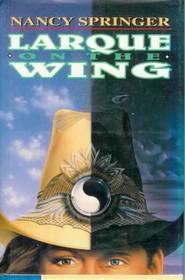Helpful Score: 1
Very different from most of Springers books, which tend toward classic fairy-tale fantasy. This one is more reminiscent of Margaret Atwood, with a thematic agenda of feminism, sexual relations and aging. The fantasy elements are more surreal than actual fantasy.
The protagonist, Lark, has always had a strange habit of summoning up what she calls doppelgangers physical manifestations caused by her unbidden thoughts. As the story begins, she has created one that seems to be a particularly unpleasant incarnation of herself as a child. Lark comes to realize that not only does she not like this child who is herself, but she also dislikes her current self overweight, married, and boring, not having lived up to everything that the child Lark had hoped for. Through encounters with a handsome and mystical gay man who also has powers of transformation and with her mother, who has her own supernatural gift of denial Lark goes through various transformations of identity and gender while coming to terms with her life as a middle-aged woman.
The protagonist, Lark, has always had a strange habit of summoning up what she calls doppelgangers physical manifestations caused by her unbidden thoughts. As the story begins, she has created one that seems to be a particularly unpleasant incarnation of herself as a child. Lark comes to realize that not only does she not like this child who is herself, but she also dislikes her current self overweight, married, and boring, not having lived up to everything that the child Lark had hoped for. Through encounters with a handsome and mystical gay man who also has powers of transformation and with her mother, who has her own supernatural gift of denial Lark goes through various transformations of identity and gender while coming to terms with her life as a middle-aged woman.




